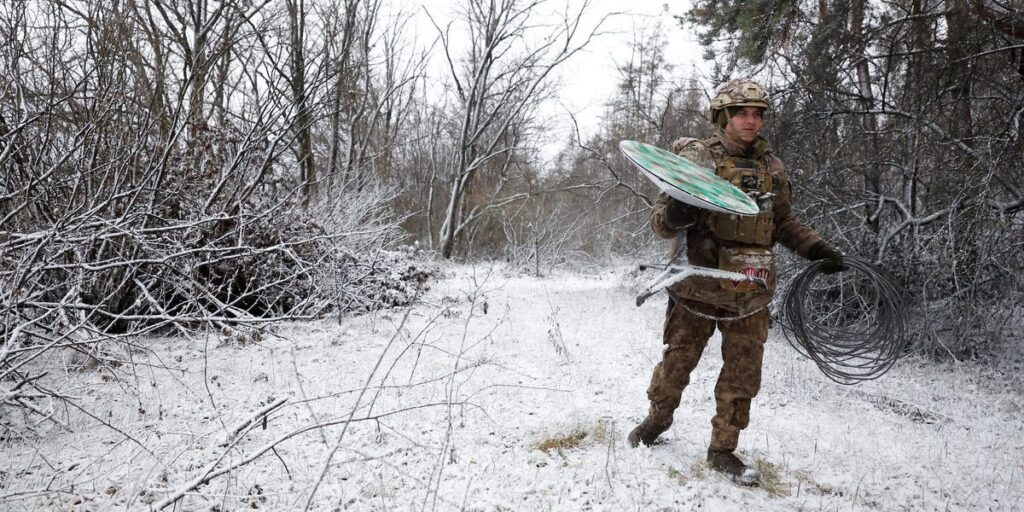Starlink internet satellite services that are key for Ukraine’s military went down across front lines on Monday during a short global outage.
Tens of thousands of users reported issues with Starlink across multiple countries, including the US and Ukraine, on Down Detector from around 1.15 a.m. ET. Reports fell to a much smaller number around an hour later, with some users still logging issues at around 6.30 a.m.
At its peak, about 37,000 US users reported issues on Down Detector, which tracks outages by gathering user-submitted reports, while 161 users reported issues in Ukraine.
Robert “Madyar” Brovdi, the commander of Ukraine’s Unmanned Systems Forces, wrote on Telegram on Monday morning that Starlink was down across the entire front line. Just over half an hour later, he wrote that it was gradually recovering.
Alex Eine, the section commander of a drone unit in Ukraine’s Separate Presidential Brigade, told Business Insider that he relies on a Starlink connection because there is no cellular service in the area he is operating in, and having a stable internet connection is crucial for conducting operations.
Eine said that Starlink had been searching and failing to connect for hours, and his unit was forced to postpone some scheduled drone flights and return to its base.
However, not every unit’s operations were affected by the outage, Eine said, because they might use radios or other communications systems.
It is not clear what caused Monday’s outage. SpaceX, which owns Starlink, did not immediately respond to a request for comment from Business Insider.
Ukraine relies on Starlink internet
Since Russia’s full-scale invasion began in February 2022, Ukraine’s military has used Starlink to communicate and to gather intelligence, like learning about Russian positions, as well as to keep hospitals and emergency services connected in conflict areas where civilian infrastructure has been destroyed.
While key, Ukraine’s access has been threatened by rare outages, Russian efforts to interfere with the system, and SpaceX CEO Elon Musk’s decisions about how the service can be used.
NurPhoto / Getty
Musk, in March, described Starlink as the “backbone of the Ukrainian army” and said that “their entire front line would collapse if I turned it off.”
He pledged not to do so, saying that “no matter how much I disagree with the Ukraine policy, Starlink will never turn off its terminals.”
The service has not been without issue for Ukraine.
A US veteran who is now training Ukrainian soldiers in the country told Business Insider that Ukraine heavily relies on the system, and ideally would have a more diverse array of communication means.
Ukrainian officials said in September 2022 that Musk had blocked Starlink access in Crimea, a Ukrainian region that Russia annexed in 2014 and still occupies. Musk then said in January 2023 that Ukraine could not use it for long-range drone strikes.
That sparked anger in Ukraine, with presidential advisor Mykhailo Podolyak saying that SpaceX needed to pick a side: Ukraine and “the right to freedom” or Russia and “its ‘right’ to kill and seize territories.”
REUTERS/Clodagh Kilcoyne/File Photo
Ukrainian military intelligence also said last year that Russia was using Starlink to facilitate communications on the battlefield, something that Musk denied.
The service has also been somewhat vulnerable to Russian electronic warfare, with Russia able to cause widespread disruptions to the service last year for the first time, The New York Times reported. But it has broadly been resistant to Russian efforts, making it key for Ukraine’s forces.
Some in Europe have signalled worry about how much the service could be relied on. Radoslaw Sikorski, Poland’s foreign minister, said in March that his country “will be forced to look for other suppliers” of satellite internet service for Ukraine if SpaceX “proves to be an unreliable provider.” Poland buys many of Ukraine’s Starlink terminals.
Sikorski’s comments were what sparked Musk’s pledge not to turn Starlink off, but Musk also used the opportunity to brag, posting: “Be quiet, small man. You pay a tiny fraction of the cost. And there is no substitute for Starlink.”
Ukraine’s service also depends on Starlink’s global availability. Large-scale outages are rare, but they have occurred before.
It had an hour-long outage in July, when the service went down for tens of thousands of users internationally. Brovdi, the commander of Ukraine’s drone forces, said at the time that “Starlink is down across the entire front. ” When it resumed, he said that it showed how much Ukraine relies on the system and that Ukraine’s communication services should be diversified.



